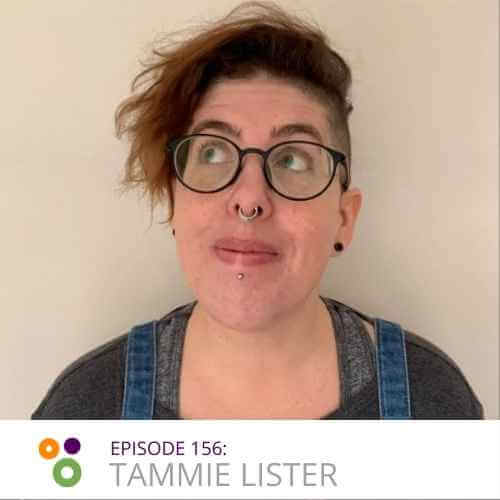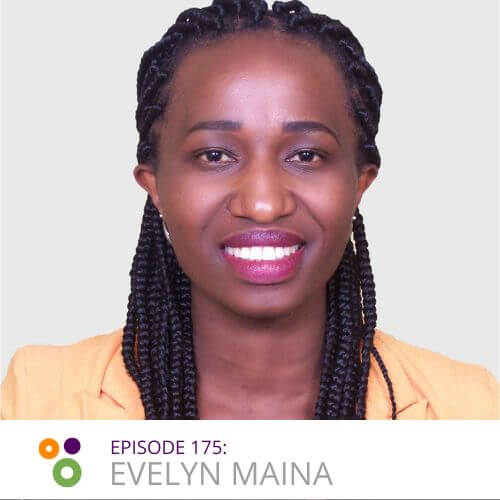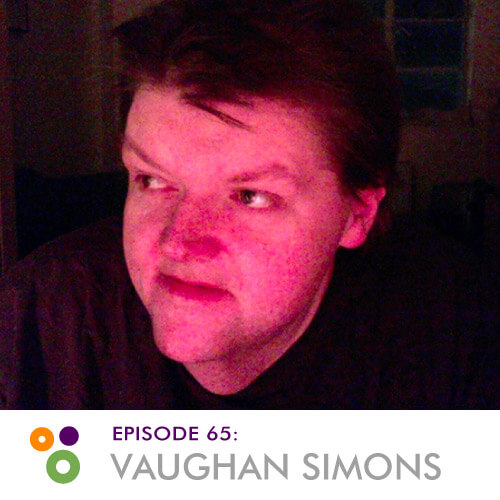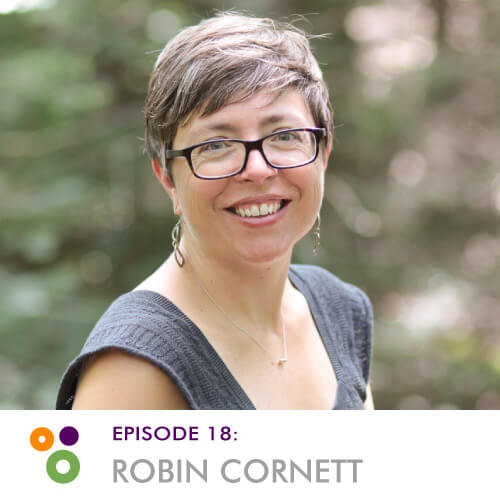Episode 88: Lisa Stambaugh
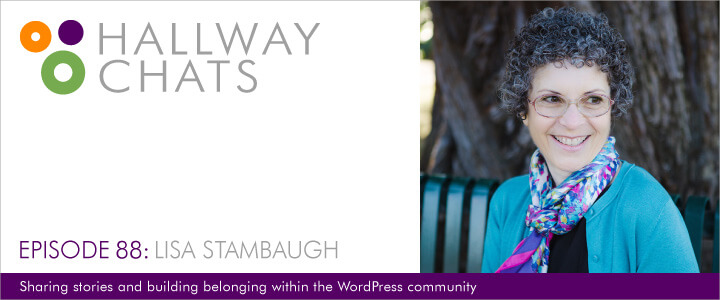
Podcast: Play in new window | Download
Subscribe: RSS
Introducing Lisa Stambaugh
Lisa Stambaugh has been known as “Web Diva®” for over 20 years. She is a knitting enthusiast, curly girl and cookie artiste. That’s not all! She tells is also she is an obsessive wordsmither and musical theatre devotee.
Show Notes
Book | Web Diva Wisdom
Website | Collective Discovery
Website | Much Ado About You
Blog Post about Women in Tech | The Importance of Female Mentorship In The Tech Industry
Cookie Recipe | Mocha Chip Cookies recipe
Episode Transcript
Tara: This is Hallway Chats, where we meet people who use WordPress.
Liam: We ask questions, and our guests share their stories, ideas and perspectives.
Tara: And now the conversation begins. This is episode 88.
Liam: Welcome to Hallway Chats. I’m Liam Dempsey.
Tara: And I’m Tara Claeys. Today, we’re joined by Lisa Stambaugh. Lisa has been known as web diva for over 20 years. She’s a knitting enthusiast, curly girl, and cookie artist. That’s not all. She tells us she’s an obsessive wordsmither and musical theatre devotee. Lisa is a writer for the GoDaddy Blog and the author of Web Diva Wisdom: How to find, hire, and partner with the right web designer for you. Welcome, Lisa. Glad to have you here today.
Lisa: Glad to be here.
Liam: Hey, Lisa. Thanks for joining us. Can you tell us a little bit more about yourself, please?
Lisa: Well, I live in Fremont, California, which is right in Silicon Valley. I grew up here. I’ve pretty much always been kind of where the action is in the high-tech world, and my mom still lives in the house I grew up in and we always say, if you draw a triangle between Google, Facebook, and Apple, that house is right in the middle. 60 years ago, they landed in this sweet spot. That’s been great. I’m married, I have two kids that are both adults. one is an engineer and the other is a veterinarian. I have a grandson so being called Bubby is probably the best thing I’ve been called in my life. You mention Web Diva and I will say that when I got into this business over 20 years ago, it was all guys, they were all Web Masters. I thought that sounded a little bit too much like Dungeons & Dragons and I started calling myself the Web Diva. it was kind of a joke, and it stuck. And I have a registered trademark on that and it’s kind of my brand, it’s in the title of my book. So I kind of enjoy having that web diva reputation, so to speak. I came into the web world after 18 or so years in high tech, in more traditional, I guess what you call, engineering, quality, IT, kind of what you’d expect jobs if somebody said you were an engineer. And I was ready for a change and a lifestyle that worked better with small children and didn’t involve so much travel and crazy hours. And I had some web experience because I was managing an IT department and the website was part of our domain, and I had started doing a little fun and games website stuff on the side. It took a flier on it being a short-term, let’s see how this goes, career, and it turned into something. Right place, right time. So over 20 years in the web world based on that.
Tara: And then WordPress specifically?
Lisa: WordPress specifically– okay, when I started doing websites, the latest and greatest tool was FrontPage 95. Thank god that’s not the answer anymore. So I did some work with that, moved into Dreamweaver, got into WordPress about 2010-ish, and pretty much once I went there, I never went back. I moved all of my sites to WordPress, and then pretty much, if people come to me and want a website, and they don’t want WordPress, then they don’t want me. That’s everything that I do.
Tara: How do people come to you, Lisa? Do they come from word of mouth?
Lisa: I’m very lucky in a variety of ways I get a lot of referral work. I was the first person having a freelance web business in our town at the time, it was pretty easy because I was the only game in town. Of course, there are many people doing that now and there are many sort of ‘do it yourself’ options and more paths for people to get to a website. But everything is by referral. I’m also a member of the Chamber of Commerce, I’ve been on non-profit boards. There are many venues, avenues to getting referrals. Quite a few when my kids were still in school, through other parents who said, “Oh–” And I managed the high school’s website for 11 years. Every high school parent knew who I was based on that, that didn’t hurt me either.
Tara: Yes, we have similar background in that regard. As well as an affinity for cookies and musical theater. Do you participate in musical theater or do you just like to go watch?
Lisa: I’m not the person you want on stage but I go to the theater as often as I can and I’ve been volunteering for many years with a local musical theater group. I do their website, of course, but even more fun, I work on costume design.
Tara: Oh, fun. Do you have a favorite musical?
Lisa: Oh, don’t make me choose. [laughter] I can tell you that I’ve seen pretty much all the major ones. I go to San Francisco probably once a month to see whatever’s touring. I will say that my favorite ones for making costumes for, once I designed a coat for Joseph and The Technicolor Dreamcoat, and that was a many, many-hour project. Once, they did Cats and that’s 50-some people. They were wearing airbrushed unitards and I knitted arms and leg-warmers and arm-warmers for the entire cast.
Tara: Wow.
Lisa: That was quite a fun project.
Tara: Fun. I just saw the revamp of Cats a couple of years ago in New York. I’ve seen it when I was young, too. The costumes are amazing in that show, really. That’s cool. We won’t bore everybody with musical theater stories but I love to go see them as well. Tell us a little bit about your involvement in the local WordPress community. You mentioned that it’s grown, you were the first person there to make websites. Is there a WordPress community there now?
Lisa: I wouldn’t say I was the first freelance web designer in town and over the years, in the beginning, people would come to me and know nothing. “I know I need a website.” They don’t know what tools they need, they don’t understand the platforms, and they would just take my advice whatever we would do. Now, of course, people either are more educated or think they know more. So there’s a lot more discussion about pros and cons of platforms and why do you use this one, and what makes you an expert on that. Being part of a community like WordPress, whether it’s WordCamp or remote discussion groups or various things, it’s an easy sell to potential customers to say, “Look, I’m part of this community, I interact with other people.” There’s a huge amount of complementary work being done where you have to explain to people what a plugin is or a theme. But you can say, “Look. If there’s anything you want to do on your website, I know either how to find that or find someone who knows that, or I have the tools, or the smarts are there somewhere in the WordPress universe to solve whatever your problems are.” And that becomes a great selling point to clients, to say, “You’re part of this community of people doing the same kind of thing.” And then a side benefit of WordPress that I consult pretty easily is the ones who want to do their own blog, I can say, “Look, we’ve got a facility for you to participate in this. You can leave the heavy lifting to me, I’ll do all the back-end and all that stuff, but you can be involved and let me show you examples. Or I can hook you up with resources or people.” And being part of that group, and not only is it obviously, to me, a more holistic or more complete way to build and support sites, it’s knowing that there’s other people who have the same problems. When I have a– I don’t want to say problem. When I have a challenge or when I have an issue or a question, somebody knows how to do this. You’re never the first person to solve anything. And I like that there’s this big community of WordPress people that you can talk to anywhere, and you have a bond and everybody’s helpful. People share what they do. It was a really good find for me in terms of shaping the path I was going down in my business, I think because of that. And they don’t have a WordCamp, to my knowledge, anywhere in Silicon Valley probably because there’s so much else here. I end up going to Sacramento, which is a couple of hours north. Which is very reasonable as opposed to traveling for– but it’s fun to go to these things. And you always learn crazy, unusual, interesting things from people standing in the lunch line, standing in the– Excuse me?
Liam: I said, “Absolutely.” Let me ask you a question about– I won’t call it sales pitch, I know that’s not exactly what you said, but you’re talking to prospective clients about the value of the WordPress community and how– to kind of paraphrase, they’re not stuck with something that no one knows how to fix. It’s not a unique system. There’s a lot of people out there who know how to use that and they follow standards and codes. Are you seeing anything around prospective clients looking for systems like Wix and Squarespace because they hear so much advertising around that? Have you encountered that in any kind of way when talking to clients about the benefits of WordPress and the community around it?
Lisa: I have actually helped people implement Squarespace sites when it’s, let’s say, a volunteer project, they have very minimal needs, they don’t need somebody on call to deal with a lot of problems, they want to manage it themselves. For whatever reason, I don’t market myself as somebody who builds Squarespace but I understand that there is a time and a place for sites like that. My experience with using Squarespace, it’s kind of a one-size fits all, great for the ‘do it yourself’ person. Very limited in customization. So for some people, that’s the right answer. For the people who want to hire me, they want a lot more than what those systems can offer. And I used to joke some years ago, I’d say, “Some day, these systems will be good enough, they’ll put me out of business and I can retire.” We’re not there yet because even when you have the best technical front end that’s bulletproof from novices, that doesn’t help you at all with organizing the information, presenting the information, understanding your audience and how to build the site to interact with them in a way that does whatever it is you need them to do. So the tool by itself is not enough to make a great website, even WordPress by itself is not enough to make a great website. You need architecture, you need understanding of your audience, you need exceptional writing, you need messaging. There’s all these other things that go into it. WordPress is the platform, it’s the framing of the house or whatever you want to say, but by itself, it doesn’t build a great website. But it enables me to build what I like to think are great websites.
Liam: Lisa, let me ask you a question about success and it’s a question that we ask all of our guests here on the show. And it’s really asking you to think about and share your own definition of success, whether that’s a professional definition, a personal definition, or maybe a mix of both. How do you define success?
Lisa: Success to me, I think there’s sort of a standard thing which is, I’ve delivered something that somebody wants. But I like to think that success relies a lot on learning and improving, and process improvement is kind of a big deal to me. I like to think that I’m always learning and improving, but also that I’m helping my clients or whoever learn and improve as well. It’s a great day when I can teach a client something. Whether it’s about websites, or business, or writing, or anything, it’s like, “Okay, good. That was a successful day.” And I really enjoy writing. Here, I’ve written a book, I write articles. I like to think I learn and improve when I’m writing those pieces because I have to do research. For people who write articles, sometimes you choose the articles and sometimes the editor chooses the article. And I might get to sign something I’m not an expert in but I learn about it–
Liam: Have to learn about it, yeah.
Lisa: Know well enough to write. And I do enjoy teaching. I taught a community college class for about 10 years, which was interestingly one of those things where you go to them and say, “Here’s an idea for a class.” And they say, “Great. We love your curriculum. Now we have to go find someone to teach it.” I say, “Well, me. What about me?” But the college has a rule, they have to interview whoever wants to do it. Fortunately, I got the job. And the class was ‘Women in Science and Technology’. It was ten sessions, let’s say, one hour, once a week of survey class. And the whole goal was to get women of the community college who were considering tech careers and high school seniors, again women, to come in and learn more about what the opportunities are in technology. It was more broad than just web development, which is careers in tech. And it was the opportunity to expose them to aspects of working world or working careers that they didn’t know, to meet role models, we went on field trips, all sorts of things. I’m still in contact with some of those students all these years later. I get baby announcements and announcements about their promotions and information like that, which is pretty cool. So sharing information and helping other people use that to be effective to me is a big piece of success. I would say that– and this may be sideways a little bit. When I was in high school, I was pretty good at writing and art and I thought that’s what I want to be. I want to be a writer, I want to be an artist. And the comment was, “Well, you don’t get a lot of money doing those things but you’re pretty good at math for a girl. You could go into technology.” This was in the ’70s, mind you, but it was Silicon Valley. So perhaps a little more forward thinking on that. And for some number of years, not that I was disappointed but I felt like I wasn’t getting to do some of the things I wanted to do. Now, all these years later, guess what? I have a career that does a lot of writing and art in addition to technology. And to me, I feel very successful that I merged a number of desperate things into a job that I love.
Tara: Yeah, that’s great. I love that definition of success. I want to talk to you a little bit about your– it’s fascinating that you taught a class about women in tech and that you have this diva name that you’ve trademarked for yourself. Can you tell us a little bit about your path as a woman in this field, as you’ve seen it evolve since you started and where you see the role of women in tech having changed or not changed, what are your views on that?
Lisa: first of all, my bachelor’s degree is in electrical engineering. I was the only woman in all of my classes. My master’s degree was in computer science. I was the only woman in a group of 50. And at that time, which was early ’80s, there was no undergraduate computer science. It was a graduate program in the math department and they took 50 people a year. This was at Stanford. And I was the only woman, there was this ongoing joke, which is, “Clearly, you’re the affirmative action at entry–” And not because I was the only woman, it’s because I was the only electrical engineering undergrad. Everybody else was a math major. And I really liked the fact that I was the affirmative action for not the reason of being a woman, which was kind of fun. I won’t go into some details of some crazy stories. I had jobs where I was the only woman in the lab of 200 male engineers, I had a summer internship where it didn’t take long that the engineering building did not have a women’s restroom. But next door, they did, in the marketing building. In the web world, when I got into it, again, I had been managing IT, didn’t find too many women that were managing IT departments. This was in the mid-’90s. And again, it seemed like it was mostly men. I think, now, it seems much more balanced to me in terms of the people I meet. I may be unusual in that I’m a little bit on the older side because, you know, now there are plenty of excellent college programs where people are getting a degree say in web design or something related. And there are many more younger women in that, but you don’t find any women my age, I’m in my 60s. That part’s a little bit unusual. I don’t feel at all discriminated against, I haven’t had people tell me they wouldn’t hire me because I was a woman. I haven’t seen anything like that. When I left Corporate America to do this, my kids were much younger. They were in grade school junior high. They’re adults now, they’re in their 30s. I submitted a proposal for project a couple of years ago in town. They got it down to two people, me and one other person. And the selection committee said, “We like you, you’re experienced, you’re well-known around town, a lot of people involved here know who you are, but this other guy is young, he’s really bright, we think we can give him an opportunity.” I said, “Great. Give it to him.” Anyway, they wind up hiring me and then they asked if we would like to see each other’s proposal so we can learn from it, and I’m thinking, “What am I going to learn at this point? I’ve been writing proposals for a long time.” We share the proposals. I know the other guy because he’s a classmate of my son. So, I’ve known who he was since he was in second grade. [laughter] Then you have the interesting ‘which is worse’, to lose out on a project to your friend’s mother or to lose out on a project to your child’s friend. Real generational difference. Anyway, we all laughed about it. I met with him, I did a little mentoring and coaching and he’s got his own business. As far as I know, he’s doing fine. But it’s just an interesting spread of the experiences now of who you might encounter that you would hire for web design. I am always very happy to meet younger women in technology, whether it’s engineering or web or anything related, and just to say, “You have such a great opportunity. You don’t have t fight some of the battles I did about proving that you’re as good as the guys, that people take it at face value and say, of course, you can do this work.” But the class that I taught was from 1990 to 2000 so already, that’s more than 20 years ago.
Tara: Yeah, it’s very different now than it was then.
Lisa: Things have changed. And at that time, there were many women– again, some of them were high school seniors, they came to the class, they did not know any women engineers or women in technology. If their own parents were not in it, they may not have been exposed to some of it. For them to come and hear guest speakers in various fields and get some exposure to those backgrounds was really cool. I don’t feel like I have to do that so much now in the web world.
Tara: That’s good to hear. It sounds like you have enough confidence that being an older woman, being a woman in tech, you’re using it as your advantage, I guess is what I want to say, and it is an advantage in many ways. You probably stood out even more than you do now as a woman in the field of tech. What do you find to be your biggest or has been or currently is your biggest challenge in that path to success?
Lisa: I will tell you that a real challenge I had when I first left the corporate world to go into being self-employed freelance. In the corporate world, you have a fairly well-defined job. You’re managing this project, or if you’re in IT, or you’re doing the website, or you’re doing whatever. And when I went on my own, what I envisioned was a business where I had this umbrella over, here’s all these great things I can do. I can build you a website, I can do print collateral, I can do consulting along the lines of some corporate work that I had done. I could do information architecture. I was trying to do a lot of different things and it didn’t take long to figure out you can’t do a lot of things and be good at all of them. You have to specialize or at least focus. I did some corporate consulting for several years, which was fun and interesting. I taught a class inside eBay for a year, which was fun. But then I said, “You know what? I’m just going to do websites.” And then, over the course of the business, I tried to specialize even more. I only do one platform now, I only do certain types of clients. Not 100% but maybe some percent of my clients are in the Bay Area because I like to work with local people where I could meet them or go into their store, even if I don’t do it very often, I could. Over the years, I’ve really kept refining, refining, and trying to narrow down my focus so that I can do something and be really good at it and provide excellent value at whatever it is that I’m doing. Sometimes, people come to me and they might want WordPress, but they might want something I’m not going to do. And I will refer them to somebody else, or I will help them find another WordPress expert that can better provide what they need. And I think that’s a hard lesson for many people when they first become self-employed is, where do you draw the boundaries about what I’m going to do and what I’m going to continue. Again, I said success is about learning. You can’t keep learning about everything, right?
Liam: I think it also takes a while to learn what you like to do and what you want to do. And the type of project you like, and the type that you don’t. And also what sets you apart. “What are your differentiators?”, “I don’t know, I’ve only been doing this for six months.” It takes a while for clients to come back and say, “Hey, Lisa. We really like that you did this.” And then the third time you hear that, you might say, “Ah, right.” That’s something–
Lisa: “Do that again.”
Liam: Yeah. You shared with us about transitioning out of corporate into freelance and trying to figure out how you wanted to focus your business. How did you manage the business side of things? Because in corporate, you don’t do the billing, you don’t do administration, you don’t do the business development necessarily. How did you find that with freelancing, how did you tackle that?
Lisa: I have a little bit of good fortune in that my father had sort of done a similar thing. He’d work in big companies and eventually had his own business in consulting. I’ve seen how some of that worked, and of course, he was a good resource and mentor. I remember when I first started doing this, I’ve read quite a few books about how to run your own business, how to be self-employed, what are things you need to do, setting up tools and processes, and checklists, and templates, all the nuts and bolts pieces that go into it. I sort of did a self-study crash course on some of those things, the thing that I did which was super helpful for me was I met with– one of my daughter’s classmate’s mother was a CPA and I met with her from the very beginning, and she helped me set up an ESCORP, so I have a corporation, she helped me with setting up a chart of accounts and QuickBooks, explained the different financial models. Whether you keep track – accrual versus actual. It was a good choice to engage an expert on thing– I’m never going to be a financial expert. It was a good choice. And she still does my business taxes now after 20 years.
Liam: That’s a good long relationship.
Lisa: I think that was helpful. I think it helps that I’m a very organized– maybe some people don’t think that’s– my husband probably gets a little crazy with it but I’m pretty organized. I keep track of everything, I write stuff down, I have lists, I have checklists. From the get-go, trying to keep track of everything, to me was a natural thing. I think that’s a challenge for some people. The joke was always, I like being in charge of all the web stuff, but I’m also the IT department, the finance department, I’m the custodian, I’m the lunchroom lady. You have to do everything and outsourcing some things can be– no, one thing I did from the very beginning, which I’m so proud of myself, was I hired a payroll company. It’s only me, I have a company, I pay myself a salary. And for a very small fee every month, those people take money out of one bank account, put it in another bank account, file the taxes, do the W– all that stuff gets done because I don’t want to be a payroll expert and I don’t want to know the tax laws and how they change.
Liam: I like that.
Lisa: Sometimes, outsourcing, stroke of genius.
Liam: Let me ask you a question about advice and this is a question that we ask all of our guests and it’s advice that you’ve heard or have been given to you or maybe read in one of those books about running your own business. What’s the best advice that you’ve ever been given or received and implemented in your life?
Lisa: I have written articles about this advice because I like it so much. This is the advice I was given by my very first boss at my first engineering job out of college. Speak precisely and listen forgivingly. That’s it. Forward. ‘Speak precisely’ translates into taking the time to explain and not leave anything to chance when I’m talking with clients. I may err on the side of over-explaining but I try to be very clear and articulate, not make assumptions when I’m explaining things or when I’m doing things. And then the ‘listen forgivingly’ part is in work, when somebody asks for something, it’s, okay, I’m going to not take it literally sometimes because I don’t think that’s what they really meant, it’s what do I think they meant, ask for clarification, sometimes I’ll write back and say, “I think what you’re asking for is this. I want to make sure I understand that correctly and do it.” And it turns out that in communication, in general, those are really good principles to try to be precise and articulate as a judgment call. But try and not be nebulous in how you speak or wishy-washy. And then on the reverse side, try and give people room to be nebulous and try and figure out what they’re really saying. I had to write an article recently about communication skills and I pretty much talked about that because I think those things are pretty important.
Tara: They’re very important. Thank you for sharing that.
Liam: Fantastic.
Tara: And thank you for sharing your story with us today, I really admire what you’ve accomplished. I don’t mean that because you’re an older wiser woman than a lot of young people here, I’m about your age as well. But I think it’s awesome what you’ve done. I love hearing a story about the place where you worked and there was no women’s room in the building, that’s just amazing to think about. Thank you for joining us and sharing with us today, Lisa, it’s really been a pleasure chatting with you. Where can people find you online?
Lisa: Collectivediscovery.com. That’s my business, it’s a long name but I’m the only one that has it so that works.
Tara: Okay. And actually, before you go, what’s your favorite cookie? Is there such a thing?
Lisa: Ah.
Tara: I know. I’ve never met a cookie I didn’t like! [laughter]
Lisa: Here’s the one I make that always gets rave reviews and I just took a batch to the Superbowl party. It’s sort of like a chocolate chip cookie except it has chocolate chips and peanut butter chips, and coffee dissolved in Kahlua and cocoa. It’s chocolate with coffee, Kahlua, and peanut butter. [laughter]
Tara: Oh my gosh. If you have that recipe, we’ll put it in the show notes, how about that?
Liam: If you’re willing to share that, yeah.
Tara: Awesome. I am absolutely a cookie monster. Completely love cookies, definitely.
Liam: I don’t know if you send out cookie gifts to holiday friends, but if so, I’ll go ahead and forward you my address. [laughter].
Tara: Well, thanks again for joining us, Lisa. Take care.
Lisa: Well, thanks for having me. This was fun.
Liam: Thanks Lisa, nice meeting you. Bye-bye.
Tara: Bye.
Lisa: Bye.
Tara: If you like what we’re doing here – meeting new people in our WordPress community – we invite you to tell others about it. We’re on iTunes and at hallwaychats-staging.ulpgsyz6-liquidwebsites.com.
Liam: Better yet, ask your WordPress friends and colleagues to join us on the show. Encourage them to complete the “Be on the show” form on our site, to tell us about themselves.


